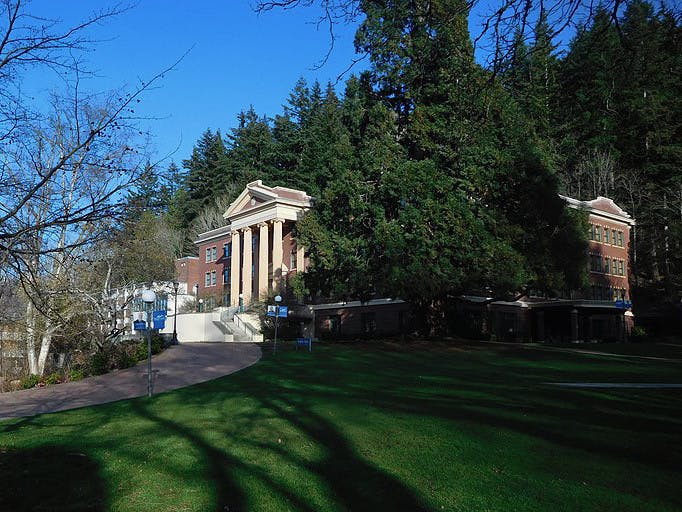Western’s recent proposal to rename Honors Program passed, proposal expected to go into effect in fall 2022

By Henrik Butz
A recent vote by the Honors board on a proposal to rename Western Washington University’s Honors Program to “Honors College” has passed.
The renaming effort stems from the fact that the current Honors Program has had all the defining attributes of an Honors College since 2012, according to the Honors College proposal. The proposal also stated the program has functioned like a college since its creation in 1962.
Honors Program Director Scott Linneman said the proposal is being discussed by two groups: the University Planning and Resources Council, a faculty advisory committee to Western administration and the Academic Coordinating Commission, a major standing committee of the Western’s Faculty Senate whose members are charged with oversight of all aspects of Western’s curriculum and curricular policy.
Linneman said the approval of the proposed name change has been put on hold at the moment by the Academic Coordinating Commission until funding for the program is determined by the University Planning and Resources Council.
Linneman said if everything works out, the transition from the Honors Program to the Honors College will likely occur in the fall of 2022.
However, renaming the current Honors Program to Honors College won’t bring any significant changes with it, Linneman said.
The Honors College will serve the same function as the Honors Program but with a different title. The Honors College won’t offer degrees, have departments or serve any functions that one would associate with a college, Linneman said.
“So it's partly just to enhance the recruiting function,” Linneman said.
The college hopes to increase the program admittance numbers over the next three to four years, as well as increase the number of tenure track faculty teaching at the college, Linneman said.
The program’s efforts to recruit a diverse pool of students and its impressive student retention numbers have played a large part in the administration’s recent decision to start moving forward with the name change, Linneman said.
In 2020, the program admitted 225 first-year students. 72% were women, 23% were students of color and 11% were first-generation college students, according to the proposal.
The proposal also shows that 94% of Western’s Honors students continue to their second year and 91% continue to their third year.
Michael J. Stebleton, associate professor of higher education at the University of Minnesota, Twin Cities, said honors programs are set up to be intensive, student-focused and faculty-driven. This provides students a highly intellectually stimulating environment that allows them to learn from one another and encourages them to remain in college.
“A lot of colleges are putting more emphasis on this idea of student engagement and student-faculty interaction,” Stebleton said. “And so the Honors Program is one way to market and then probably more importantly than to actually offer these opportunities to students.”
However, concerns surrounding the proposal were raised by members of the Associated Students of Western Washington University Executive Board in their Feb. 19 meeting.
AS Senate Pro-Tempore Sargun Handa said the proposal was being fast-tracked in a top-down push by Western administration.
Handa said the change seemed like a profit-making tactic to attract out-of-state students, with Western’s President Sabah Randhawa having a history of creating Honors Colleges at previous universities to make them more appealing to out-of-state students.
Despite the claim made by Handa, Randhawa has only held one previous position in higher education at Oregon State University.
The OSU Honors College was founded in 1995 by the Oregon State Board of Education, during which Randhawa was serving as the department head of Industrial and Manufacturing Engineering at OSU and had not yet entered his later role as OSU Executive Vice President.
Conversations among Western administration surrounding the renaming of the Honors Program have been happening for the past three to four years, Linneman said.
Linneman said the purpose of the name change is to focus on recruiting students within Washington who have worked hard throughout high school but are mostly attending the University of Washington and not considering Western.
“The Honors College prides themselves on being very selective, very elite ... and there's a degree of status to be affiliated with that program,” Stebleton said. “So there's some students that are attracted to these programs right out of high school.”
Other concerns brought up in the meeting related to the Honors Program admissions system and critiquing it as a merit-based system that seeks to serve advantaged students. This goes against Western’s Black Student Organization’s demand to erase merit-based application systems at Western.
Linneman said the program does not look solely at test scores as the basis for admission and instead takes a holistic approach that includes several interesting essay requirements.
However, of those admitted into the program in 2020, the average SAT score was 1340 out of 1600, and the average ACT was 30 out of 35, according to the program’s demographics.
Stebleton said universities recognize the ability of honors colleges to attract high-ability students from diverse groups. As a result, more colleges and universities are looking to implement honors programs and colleges into their existing curriculum.
“I think students benefit, but I think also, you know, faculty members and instructors do as well because they're working with a hopefully very diverse, but also very motivated, smaller student population,” Stebleton said.
Henrik Butz is a former reporter for The Front.





